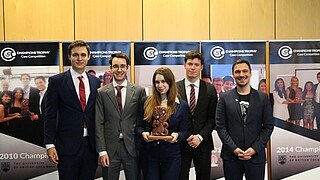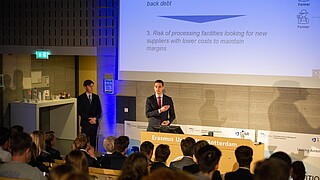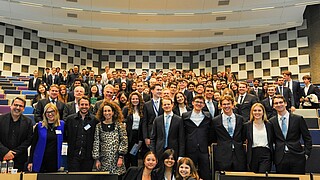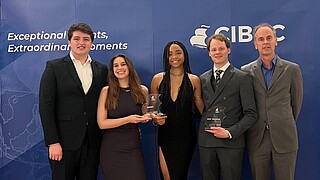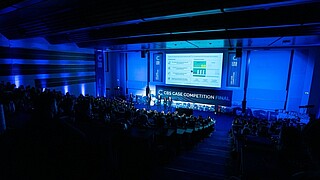“All the plans were impressive and high-level, with good analysis and were really worked through – it was hard to choose a winner,” said one of the judges Josephine Meijaard, Retail Experience Performance and Review Manager at Inter IKEA BV.
Organiser Anton Rzaev said: “Finally being able to host a physical case competition felt incredible! The organising committee has been working for nine months to make this competition a reality. Meeting the teams and seeing all our planning coming together into one exciting week felt extremely rewarding. We were particularly happy about our participants’ positive attitude!”
For many of the students, this was their first international visit to another university to take part in a case competition. The RSM STAR competition was additionally exciting because of the large number of teams competing – 16, the largest competitive field since the RSM STAR competition began eight years ago. The week included social, cultural and career-oriented activities with days (and nights) out in Rotterdam and Amsterdam, networking dinners, and inspiring external speakers.
What would Generation Z do?
The competition theme – ‘Breaking new ground’ – was inspired by the past two years of restrictions that forced everyone to become more inventive to be able to continue interactions between students and companies. The student teams were asked to find innovative solutions in a post-pandemic world; they were asked for ideas that break new ground in business and management. For the companies, it was an opportunity to find new ideas from ‘Generation Z’, people born between the mid-to-late 1990s and the early 2010s who would become employees and customers of their brands.
The students presented their ideas in timed pitches and Q&A sessions with the judges. The overall competition winner was determined by the total score. The 12-hour case contributed 40% of the final score and the 24-hour case contributed 60%.
Domino’s – valuing diversity
The teams were given 12 hours to explore opportunities for multinational pizza company Domino’s to attract more employees and improve its employee retention rate.
The winning team for this case was HEC Montréal, which proposed that the organisation should value diversity and improve the sense of belonging of underrepresented groups. They suggested partnering with local immigration organisations and investing in local cultural and sports events. The jury liked very much that the team proposed to reach out to groups of employees that were not yet on the radar, instead of focussing on increasing commitment with its current employees only.
They also proposed that Domino’s Pizza in the Netherlands could improve its employee well-being to improve engagement and increase the likelihood of employees promoting the company’s culture to others. The HEC team also recommended Domino’s could sponsor the education of its high-performing employees and improve the allocation of employees in busy periods. The employer brand also came under scrutiny; the company could become known for encouraging upward mobility with a fun and flexible work environment, suggested the students. A strong marketing campaign would help the company to solidify its employer brand while improving its potential to attract new talent, said the HEC team.
The students’ proposals were considered by a jury of experts, business practitioners and representatives from the companies involved.
In the finals for the 12-hour Domino’s case, the judges were
- Misja Vroom CEO of Domino’s Netherlands
- Adri Meijdam, executive director of bachelor programmes at RSM
- Michelle Wright HR Business Partner at ING
- Marc van Nuland Country Manager Aon Nederland and CEO of Aon Commercial Risk
- Roberto Rossi HR Director at ING
- Lilly Burggraaf VP Global Human Resources at UniQure
- Elmer Schaap Global HR director at Ahold Delhaize
Next generation of customers for IKEA
The 16 teams were challenged to deliver novel ways for multinational furniture conglomerate IKEA to continue to excite the next generation of customers and create strong connections. Corvinus University of Budapest performed best in this 24-hour test – and won the competition overall. For IKEA the Corvinus team proposed a full transition to a unified commerce model – collecting centralised data about customers and products on a single platform – by developing a virtual store with a high level of personalisation and ensuring a seamless connection between customers’ online and offline journeys. Corvinus’ novel suggestion was a series of ‘Small Blue Box’ compact concept stores to bring the IKEA experience closer to customers in city centres.
In the final for the 24-hour IKEA case, the judges were:
- Josja van der Maas Head of Learning at IKEA Franchise
- Heléne Davidsson Sustainability Manager Global Franchisor at Inter IKEA BV
- Josephine Meijaard Retail Experience Performance and Review Manager at Inter IKEA BV
- Daniel Bobryk Chief Financial Officer at IKEA Group
- Ansgar Richter Dean of RSM
- Michel Lander Dean of Education at RSM
- Berry Diepeveen Managing Director and Senior Partner at Boston Consulting Group
International visiting teams
RSM fielded its own team to compete against 15 other visiting universities. The RSM team comprised Thalia Ripoll (BScIBA 2024); Maximilian Meinicke (BScIBA 2024); Hanna Forsmann (BScIBA 2023); and Julius Kistner (BScIBA 2023).
Visiting teams were:
- Ivey Business School, Western University
- Foster Business School, University of Washington
- Beedie School of Business, Simon Fraser University
- University of Florida
- HEC Montréal
- University of St. Gallen
- John Molson School of Business, Concordia University
- Frankfurt School of Finance and Management
- Corvinus University of Budapest
- IE Business School
- University of Amsterdam
- Chulalongkorn University Business School
- Maastricht University
- National University of Singapore
- Korea University Business School



